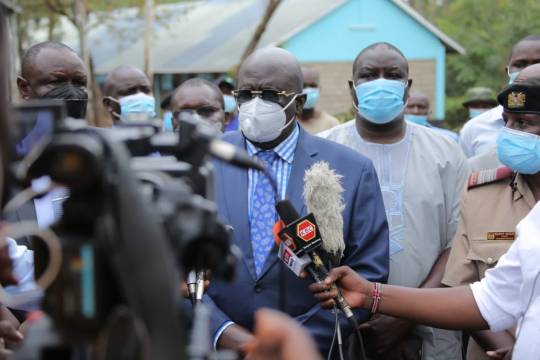
How Mandatory Drug Test In Schools Contradicts Government Document Launched At KICD.
The fight against drug and substance abuse in schools is facing serious setbacks after it was revealed that the government may have passed the burden to teachers.
Parents, the majority of whom have lost control of their children’s discipline and find it easier to send them to school, are caught in the middle, with school administrators running the show.
And, in the absence of proper direction and guidance on drug and substance abuse management among students, secondary school principals have adopted a herd mentality, implementing haphazard methods they deem appropriate.
The government is now under fire for turning a blind eye as school administrators violate provisions of a drug and substance abuse strategy document released last year.
It is now becoming clear that the mandatory drug testing in schools, which is supported by senior Ministry of Education officials, contradicts a government document released last year to detect and prevent drug and substance abuse in schools.
Prof George Magoha, Education Cabinet Secretary (CS), released the document titled “national guidelines for alcohol and substance use prevention and management in basic education institutions.”
During the launch at the Kenya Institute of Curriculum Development, Interior CS Fred Matiang’i was represented by his Principal Secretary (PS), Dr Karanja Kibicho (KICD).
A large number of officials from the National Authority for the Campaign Against Alcohol and Drug Abuse (NACADA) as well as top education ministry officials were present.
The document, which was released in July of last year, outlined seven key strategy points for combating and managing the vice in schools.
To avoid stigma and discrimination among children, school administrators are required by the strategy to maintain the confidentiality of students found to be abusing drugs within the school setting.
It also states that any punishment meted out to children found to be abusing drugs or substances must be corrective rather than punitive.
In addition, any interventions implemented in schools must be age-appropriate in both method and form.
The guideline states that “The content and interventions implemented shall focus on information, personal and social skills relevant to the learners’ development stage,”
The 34-page document also states that all interventions must be based on scientific evidence and that their implementation must be monitored and evaluated.
The document also requires early intervention in drug abuse, as well as exclusivity and non-discrimination.
NACADA has distanced itself from the drug tests, claiming that there is no law in the country mandating drug testing for students.
“We advise that even when conducted, drug testing should be part of a comprehensive intervention program and thus should not be used as a sole solution to the problem of alcohol and substance abuse in institutions of learning,” said Victor Okioma, NACADA Chief Executive Officer (CEO).
Okioma urged school administrators to follow the National Guidelines for Alcohol and Substance Use Prevention and Management in Primary and Secondary Schools.
According to interviews with school principals, the contents of the strategy document have yet to be shared with school administrators, raising concerns about the government’s commitment to combating the vice.
Secondary school principals claimed that some drug tests were handled carelessly, in violation of the ministry’s strategy document, and without due regard for students’ privacy.
According to Kahi Indimuli, national chairman of the Kenya Secondary School Heads Association (Kessha), some heads have blindly rolled out tests simply because it was done in another school.
The guidelines were to be used in basic education institutions and applied within school grounds and at school events, according to the strategy document.
School administrators now argue that they have been left on their own to devise local methods for dealing with the vice that may be best suited to their circumstances.
The mandatory tests have elicited a range of reactions from the general public.
Counseling psychologists, lawyers, and other stakeholders have criticized mandatory testing, claiming that it is not a reliable method of managing indiscipline among students.
They called the exercise illegal, unconstitutional, and a violation of students’ rights.
According to Dr. Lukoye Atwoli, a psychiatrist, schools’ approach to mass testing will not help solve the indiscipline problem. The Dean Medical College at the Aga Khan University says drug tests are only conducted with an objective in mind.
He believes that the best approach is to ensure that each school has access to a mental health professional.
Indimuli stated that critical stakeholders have not stepped forward to help with the management of the vice in schools.
“The fact is that most stakeholders are standing aloof and waiting for something to happen to blame teachers. They are not offering solutions to collaboratively assist in managing the vice,” said Indimuli.
As a result, Indimuli stated that ‘everyone approaches student discipline with caution because support from parents, security, and other stakeholders is minimal.’
A total of 13 players were identified as critical in the prevention and management of alcohol and substance use in schools in the strategy document.
Teachers Service Commission (TSC), NACADA, education, interior, and health ministries are all mentioned in the strategy document.
County governments, county education boards, school boards of management, teaching and non-teaching staff, parents or guardians, faith-based organizations (FBOs), civil society organizations (CSOs), school community-based organizations (CBOs), and development partners are also listed.
Also Read:
Indimuli stated that most schools, not knowing how to deal with the situation, borrow from what other institutions are doing.
“The tests began after Maranda high school did it. It is not a government directive and we do not have a circular directing them, to do so. But what is clear is that each school wants to do something,” said Indimuli.
He did, however, state that no matter what methods are used, the Basic Education Act is supreme.
How Mandatory Drug Test In Schools Contradicts Government Document Launched At KICD


